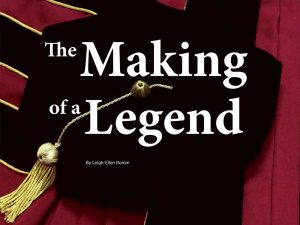 hrough the changing seasons of Austin College’s history, a values-based mission and a foundation in the liberal arts have combined to deliver educational experiences that transform the lives of students. The constant throughout: Faculty members dedicated to providing exceptional learning opportunities.
hrough the changing seasons of Austin College’s history, a values-based mission and a foundation in the liberal arts have combined to deliver educational experiences that transform the lives of students. The constant throughout: Faculty members dedicated to providing exceptional learning opportunities.
Alumni through the decades tell of legendary professors, now gone, who pointed them to their future selves: Moorman, Bryant, Edwards, Cawthon, Gourley, Love, Phillips, Low, Day, McCarley, Freeman, Melugin, Neidhardt, Beardsley, Mason, Manley, Lunkley, Street, Pierce. The list goes on and on, and includes many emeriti faculty who, thankfully, remain in the Austin College community. That proud history looks toward a promising future with current faculty on their way to becoming the legends of tomorrow.
What makes them great? Extensive knowledge of their subjects, with the ability to communicate that clearly to students, is a given. One faculty member may have animated, infectious enthusiasm; another’s gentle devotion to a specialty draws out students’ fondness for the same.
Many current and “in-the-making” legends are teaching because of a past educator’s influence and impact. In their work here, Austin College faculty continue the cycle of inspiration as they share their love of teaching and learning with students, the results to be passed along to another generation as those students graduate and have impact through teaching or other career roles.
Dr. Roger Platizky, Shoap Professor in English Literature, has taught at Austin College since 1988 and plans to retire at the close of the 2018-2019 academic year. He has eloquently expressed an educator’s heart: “I hope the passion and knowledge we share in the courses we teach will stay with our students, like time-released particles that help them find purpose, meaning, resilience, and happiness in their lives long after they graduate.”
Educators become legendary because, through their own commitment to excellence, they make a positive, lasting difference in students’ lives.
Read more about six current Austin College faculty representatives who offer comments on some of the qualities and actions that define legendary faculty.
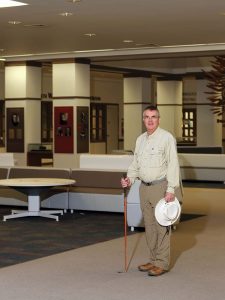 Investing Personally
Investing Personally
To be an effective teacher, you have to care that students know the information, concepts, and skills that are important in the disciplines you teach. At a place like Austin College, it also helps a lot to care about the students personally and to show that in a variety of ways: know about their campus activities, what their plans and aspirations are, what they like to do outside class, et cetera. Sometimes I show them I care by cooking something for our field trips—they really like my ScotchaROOS!
Dr. Steve Goldsmith
Dean of Sciences
Professor of Biology
Steve is humble when he talks about caring for his students, saying it seems like it would be common for a good teacher to respond as a good person would. He recalls driving almost an hour roundtrip back to Hagerman Wildlife Refuge to retrieve a student’s phone that had been left behind after a field study trip. She needed her phone—so he went to get it. He practices the kind of caring that comes from knowing students so well that years later, he can recall specifics about recommendations for students applying to graduate schools, medical schools, and other opportunities.
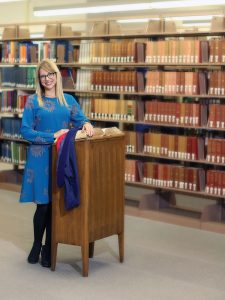 Motivating Students
Motivating Students
My own memorable teachers helped me find my voice and made me feel I had valuable ideas to offer. Because of those teachers, I’ve come to realize that teaching isn’t about me impressing students with my knowledge but about drawing out their experiences and ideas to discover the knowledge within themselves. Students learn best in my classes as they discuss literature with their peers—and that can be intimidating. I intentionally cultivate a positive, fun, and inclusive classroom setting in which my students feel safe taking risks, making mistakes, and being vulnerable with each other and with me.
Dr. Randi Tanglen
Associate Professor of English
Randi also serves as Director of the Johnson Center for Faculty Development and sees how a culture of sharing is effective in faculty development. “The Johnson Center essentially provides a liberal arts education for our faculty,” she says. “We cultivate a holistic approach to honoring the student and delivering the best Austin College experience we can. Faculty may have different approaches based on personalities or academic disciplines, but we are on the same page when it comes to providing the best education for students.”
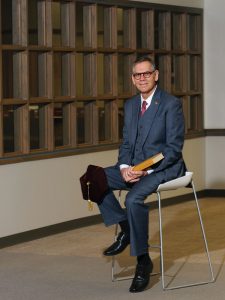 Inspiring Ideas
Inspiring Ideas
If I could take my class on a field trip anywhere in the world, I would take them to the Inis Meáin Knitting Company. It’s a textile factory that makes beautiful sweaters on a remote island off the west coast of Ireland. I want students to be inspired to create products that reflect their own unique spirit, environment, and heritage.
Dr. David Griffith
Dean of Social Sciences
Professor of Business Administration
Inspiration vs. expertise. Why not both? David sees himself as an “expertise guy” because his brand of caring is to be as prepared as possible for his students. He also says that all students must find their own inspiration. To guide them from an idea to inspiration, David can often simply ask, “Why?” Each inquiry helps focus students on their interests, which can lead to new ideas, new questions, and new answers.
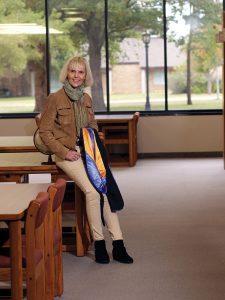 Growing Professionally
Growing Professionally
Three years ago, in order to throw myself outside my linguistic comfort zone, I began teaching myself Arabic. I spent a sabbatical at the University of North Carolina in Wilmington auditing Arabic 101 and 102. Being a student in a regular classroom there helped me gain new and invaluable perspectives on my own teaching and on the challenges students face in a foreign language classroom.
Dr. Ruth Cape
Professor of German
Ruth says she thinks people sometimes discard what they don’t understand, assuming it’s unnecessary or even wrong. She pursued the study of Arabic partially to find a way to be useful in the current cultural climate. She says one of the best ways to validate others and truly be a global citizen is to learn language. In her language classes, Ruth hopes students also learn courage, self-reliance, and self-discovery.
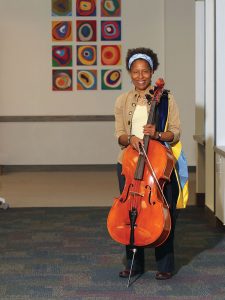 Balancing Life
Balancing Life
I say the way to be best at your job is to not do only your job. Playing music with the band at my church is what I consider to be general self-care. It’s important to my well being to have valuable, meaningful interests outside of campus. Having an extra sense of community is good for you. Plus, you can’t be divisive with people who are already your friends.
Dr. Lisa M. Brown
Professor of Psychology
Lisa is a composer and performer. A runner. A traveler. A life-long learner, teacher, and a friend to many. When she works with students who are obsessively focused on studying with no other enrichment, she’s been known to give orders for them to relax. Calling it “homework,” she asks them to lighten up. Give the learning some room to sink in. Because of her own experiences and interests, she is genuinely able to relate to many different students.
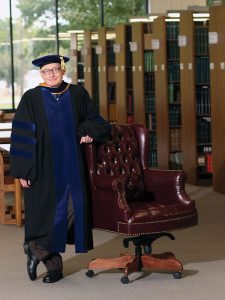 Pursuing Excellence
Pursuing Excellence
My first undergraduate research seminar, on the Reformation in Germany, was an unforgettable experience. I framed my own topic, asked my own questions, and did my best to answer them by finding and studying primary sources. I can’t replicate that experience in every class meeting, but I try to build serious encounters with the original sources into every course.
Dr. Max Grober
Dean of Humanities
Professor of History
The students who are drawn to history tend to be the great memorizers, according to Max. Their early education was filled with names, dates, and timelines. Max encourages students to study and think about what motivated the happenings of the past. He says that by understanding and respecting the personhood of the past, students will learn why the dates became historic on the timeline. He teaches young scholars to have respect for the dead and to tell their stories truthfully.

